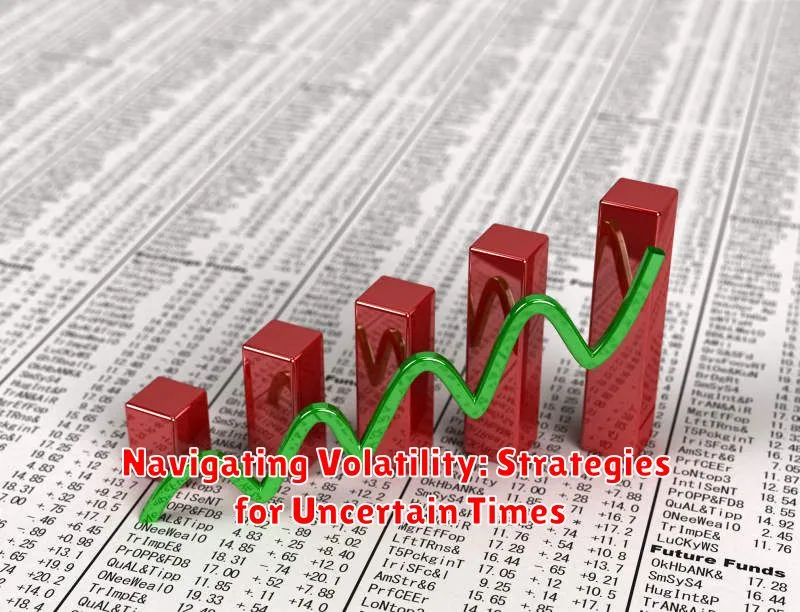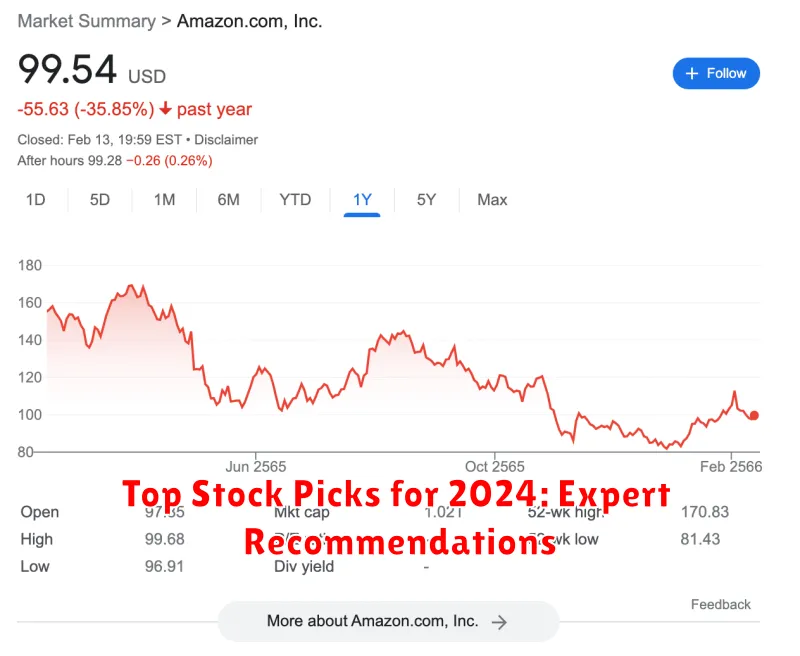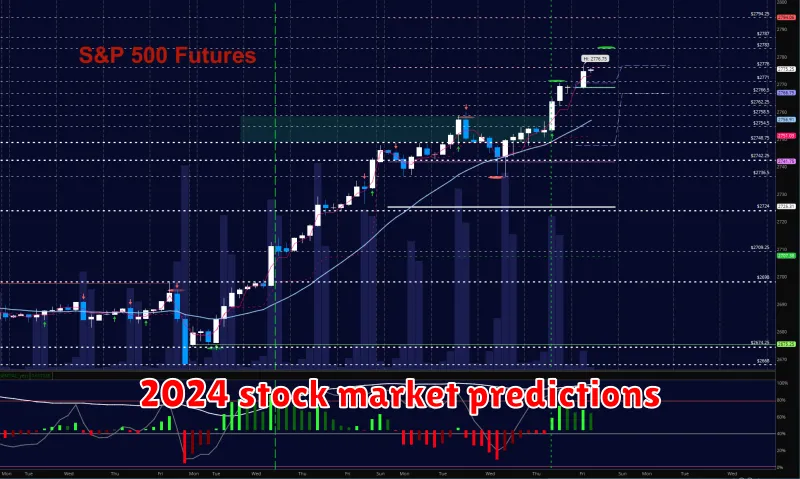Are you looking to navigate the stock market in 2024? With a new year comes new opportunities and challenges. The stock market can be a volatile landscape, but with careful planning and insightful analysis, you can position yourself for success. This year promises to be full of exciting developments, presenting both rewards and risks. Get ready to ride the wave by exploring key stock market trends shaping the investment landscape for 2024.
From artificial intelligence and sustainable investments to rising interest rates and geopolitical uncertainties, there are several factors impacting the markets. It’s crucial to understand these trends and their potential implications for your portfolio. In this article, we’ll delve into the key trends, providing valuable insights to help you make informed investment decisions. Join us as we explore the dynamic world of the stock market and uncover the opportunities that lie ahead in 2024.
Looking Ahead: What’s Driving the Stock Market in 2024?
As we embark on a new year, investors are naturally curious about what lies ahead for the stock market. While predicting the future is an impossible task, understanding the key factors that are likely to shape the market in 2024 can provide valuable insights.
One of the most significant drivers will be the Federal Reserve’s monetary policy. The Fed has been aggressively raising interest rates to combat inflation, but the impact on the economy and the stock market remains uncertain. Investors will be watching closely for signs of whether the Fed is nearing the end of its tightening cycle, and how this affects economic growth and corporate earnings.
Another important factor is the global economic outlook. The war in Ukraine, rising energy prices, and ongoing supply chain disruptions are all contributing to global uncertainty. The strength of the US dollar is also a significant factor for international businesses and markets. The outlook for the global economy will undoubtedly influence stock market performance.
Technological advancements will continue to be a key driver of growth in the stock market. The rise of artificial intelligence, cloud computing, and other emerging technologies is creating new opportunities for businesses and investors alike. Companies that are able to innovate and adapt to these changes will likely be the biggest beneficiaries.
Finally, investor sentiment plays a critical role in shaping the stock market. The overall mood of investors, whether optimistic or pessimistic, can influence stock prices. A strong economy and robust corporate earnings tend to boost investor sentiment, while uncertainty and negative economic news can lead to market volatility.
Navigating the stock market in 2024 will require a combination of careful analysis, prudent decision-making, and a long-term perspective. Understanding these key driving forces will be crucial for investors seeking to make informed decisions and maximize their returns.
Economic Growth and Its Impact on Stock Valuations
In the intricate world of finance, economic growth stands as a pivotal force, shaping the trajectory of stock valuations. When economies expand, businesses tend to flourish, leading to higher earnings and profits. This positive sentiment often translates into increased investor confidence, driving up stock prices. Conversely, economic downturns can dampen investor enthusiasm, resulting in lower valuations.
The relationship between economic growth and stock valuations is multifaceted. One key aspect is the impact on corporate earnings. During periods of robust economic expansion, companies experience higher demand for their products and services, boosting sales and profits. This, in turn, leads to increased dividend payouts and share buybacks, enhancing shareholder value and pushing stock prices upward.
Another crucial factor is the interest rate environment. As economies grow, central banks often raise interest rates to control inflation. Higher interest rates can make borrowing more expensive for businesses, potentially hindering their growth and profitability. This can lead to a slowdown in stock market gains, as investors anticipate lower future earnings.
Moreover, economic growth can influence investor sentiment and risk appetite. When the economy is strong, investors tend to be more optimistic, willing to take on greater risk and invest in stocks. This increased demand for stocks can further drive up valuations. Conversely, economic uncertainty or slowdowns can make investors more risk-averse, leading to a decline in stock prices.
In conclusion, economic growth plays a significant role in shaping stock valuations. Periods of strong economic expansion are often accompanied by higher stock prices, while economic slowdowns can lead to lower valuations. Understanding the relationship between economic growth and stock valuations is essential for investors seeking to navigate the dynamic world of financial markets.
Interest Rate Outlook and the Stock Market
The relationship between interest rates and the stock market is complex and often counterintuitive. As interest rates rise, the cost of borrowing money increases, making it more expensive for companies to expand and potentially leading to slower economic growth. This can negatively impact stock prices as investors anticipate lower future earnings.
However, rising interest rates can also signal a healthy economy with strong demand. This can lead to increased corporate profits and potentially higher stock valuations. The key lies in understanding the nuances of interest rate movements and their impact on various sectors of the economy.
For 2024, the interest rate outlook remains uncertain. The Federal Reserve continues to grapple with persistent inflation, while also monitoring economic growth. A continued tightening of monetary policy could lead to further volatility in the stock market, while a pause or even rate cuts could provide a boost to equities.
Investors must carefully consider the implications of interest rate movements on their portfolios. Diversification across asset classes, including bonds and real estate, can help mitigate risk and potentially enhance returns. Stay informed about economic indicators and central bank actions to navigate the dynamic relationship between interest rates and the stock market.
Inflation and Its Implications for Investors
Inflation continues to be a significant concern for investors, impacting investment strategies and portfolio performance. Rising prices erode purchasing power, and investors must adapt to navigate this challenging environment. Understanding how inflation influences different asset classes and finding strategies to mitigate its effects are crucial.
Inflation can impact stock market valuations by influencing corporate profits. When costs rise, businesses may face pressure to raise prices, potentially impacting demand and impacting profit margins. However, some sectors may benefit from inflation. For example, companies in the energy and commodities sectors can experience higher revenues due to increased prices.
Bonds are also affected by inflation. As inflation rises, interest rates tend to increase. This leads to a decline in the value of existing bonds, as their fixed interest payments become less attractive compared to new bonds with higher yields.
Investors can mitigate inflation risk through various strategies. Diversifying portfolios across different asset classes, including inflation-resistant assets like commodities and real estate, can help hedge against rising prices. Investing in companies with strong pricing power, which can pass on higher costs to consumers, is another strategy.
Inflation is a complex issue with significant implications for investors. By understanding its potential impacts and implementing appropriate strategies, investors can navigate this dynamic environment and preserve their portfolio value.
Geopolitical Risks and Market Uncertainty
The global landscape is marked by significant geopolitical risks, injecting uncertainty into the stock market. The ongoing war in Ukraine, tensions between the US and China, and rising inflation are key factors that investors are closely monitoring.
The war in Ukraine has led to energy price volatility and supply chain disruptions, impacting businesses and consumer sentiment. The US-China trade war continues to escalate, raising concerns about global trade and economic stability. Moreover, persistent inflation has pushed central banks to raise interest rates, increasing the cost of borrowing and potentially slowing economic growth.
These geopolitical events are likely to continue influencing market volatility in 2024. Investors need to be mindful of these risks and adopt a diversified investment strategy to mitigate potential losses. Staying informed about geopolitical developments and their impact on the economy is crucial for making informed investment decisions.
Emerging Trends in Technology and Innovation
As we step into 2024, the stock market is poised for another year of dynamic shifts, influenced by the rapid evolution of technology and innovation. Several emerging trends are shaping the investment landscape, offering both exciting opportunities and potential risks. Here are some key areas to watch:
Artificial Intelligence (AI): AI’s influence is expanding across industries, driving innovation in automation, data analysis, and personalized experiences. Companies leveraging AI for efficiency, cost optimization, and new product development are likely to attract investor interest.
Cloud Computing: The demand for cloud-based services continues to soar, with businesses migrating to the cloud for scalability, flexibility, and cost-effectiveness. Companies offering innovative cloud solutions and infrastructure are well-positioned for growth.
Cybersecurity: As cyber threats evolve, the need for robust cybersecurity solutions becomes increasingly critical. Investing in companies providing advanced threat detection, data encryption, and security awareness training can be a smart move.
Renewable Energy: The transition to a sustainable future is accelerating, driving demand for renewable energy sources like solar, wind, and hydro power. Companies developing and deploying these technologies are likely to see strong growth.
Metaverse and Web3: The metaverse, with its immersive experiences and decentralized technologies, is still in its early stages but holds significant potential. Companies developing virtual reality (VR), augmented reality (AR), and blockchain solutions are attracting attention.
Biotechnology and Healthcare: Advancements in biotechnology are revolutionizing healthcare, leading to new therapies, personalized medicine, and diagnostics. Investing in companies at the forefront of these innovations could yield significant returns.
Staying informed about these emerging trends and their impact on the stock market is crucial for investors. By identifying companies leading the charge in technology and innovation, investors can position themselves for potential growth and returns in 2024 and beyond.
The Rise of ESG Investing: Opportunities and Challenges
Environmental, social, and governance (ESG) investing has emerged as a dominant force in the financial landscape, prompting a surge in interest among both investors and corporations. This approach to investing considers a company’s impact on the environment, its treatment of employees and communities, and its corporate governance practices. As the world grapples with climate change, social inequality, and other pressing issues, ESG investing presents both opportunities and challenges for investors and businesses alike.
Opportunities abound for investors seeking to align their portfolios with their values. ESG investing offers the chance to make a positive impact while potentially achieving financial returns. By investing in companies with strong ESG credentials, investors can contribute to a more sustainable future. Moreover, the growing demand for ESG investments has led to increased investment options, including specialized funds, ETFs, and individual stocks. This expanding market provides investors with diverse avenues to integrate ESG considerations into their portfolios.
However, challenges remain in the realm of ESG investing. One significant hurdle is the lack of standardized ESG metrics, making it difficult to compare companies and assess their true ESG performance. Concerns also exist regarding the potential for “greenwashing,” where companies may exaggerate their ESG efforts to attract investors. Furthermore, the impact of ESG investing on long-term financial returns is still debated, with some studies suggesting it can positively influence performance while others find limited evidence of a direct link.
As ESG investing continues to gain momentum, investors and businesses must navigate this evolving landscape. Transparency, robust data, and a focus on real impact will be crucial to ensuring that ESG investing lives up to its promise. While challenges exist, the opportunities for positive change and sustainable investment strategies are compelling. By embracing the principles of ESG, investors and corporations can contribute to a more equitable and sustainable future for all.
Sector-Specific Trends: Where to Find Growth in 2024
While the overall market direction can be difficult to predict, diving into specific sectors can offer valuable insights. Here are some sectors that hold promise for growth in 2024:
Artificial Intelligence (AI): AI continues to be a transformative force, driving innovation across industries. Companies specializing in AI development, data analytics, and AI-powered solutions are poised for continued expansion. Look for opportunities in cloud computing, healthcare, and autonomous vehicles.
Renewable Energy: The global shift toward sustainability fuels demand for renewable energy sources. Companies focused on solar, wind, bioenergy, and energy storage are well-positioned to benefit from growing investments and policy support.
E-commerce and Digital Transformation: The rise of online shopping and digitalization continues to disrupt traditional business models. Companies offering e-commerce platforms, digital marketing services, and cloud-based solutions for businesses are likely to see strong growth.
Healthcare Technology: The healthcare sector is embracing technology to improve patient care and reduce costs. Companies developing telemedicine platforms, medical devices, and healthcare data analytics solutions are well-positioned for growth.
Cybersecurity: With increasing reliance on technology, cybersecurity becomes paramount. Companies specializing in cybersecurity software, data protection, and threat intelligence are crucial for businesses of all sizes.
While these sectors hold potential, it’s crucial to conduct thorough research and understand the specific risks and opportunities within each sector before making investment decisions. By staying informed about industry trends and identifying companies with strong fundamentals, you can navigate the market and potentially capture growth opportunities in 2024.
Investing Strategies for a Changing Market Landscape
The stock market is a dynamic beast, constantly evolving in response to economic, political, and social factors. As we embark on 2024, it’s crucial for investors to understand the key trends shaping the market and adapt their strategies accordingly. This year promises a unique blend of opportunities and challenges, requiring a nuanced approach to navigate the shifting tides.
One significant trend is the increasing focus on sustainability. Investors are increasingly prioritizing companies with strong environmental, social, and governance (ESG) credentials. This shift reflects growing societal awareness of climate change and other pressing social issues. Incorporating ESG factors into investment decisions can not only align portfolios with personal values but also identify companies with long-term resilience and growth potential.
Another trend gaining momentum is the rise of artificial intelligence (AI). AI is revolutionizing industries across the board, from healthcare and finance to manufacturing and retail. Investing in companies at the forefront of AI innovation could offer significant returns, particularly in sectors poised for disruption.
While growth sectors like AI hold promise, it’s equally important to consider value investing. This strategy focuses on identifying undervalued companies with strong fundamentals and a track record of profitability. In times of market volatility, value stocks can provide a degree of stability and potentially outperform growth stocks.
Finally, embracing diversification remains a cornerstone of any successful investment strategy. Spreading investments across different asset classes, industries, and geographic locations helps mitigate risk and enhance returns over the long term.
Navigating a changing market landscape demands flexibility, research, and a long-term perspective. By understanding the trends shaping the market and adapting investment strategies accordingly, investors can position themselves for success in the years ahead.
Expert Predictions: What the Pros See for the Year Ahead

As we navigate the choppy waters of 2024, investors are eager for insights into the potential trajectory of the stock market. While predicting the future is an inexact science, expert opinions can provide valuable guidance. Here’s a glimpse into what the pros see ahead:
Interest Rates remain a central focus. The Federal Reserve’s stance on monetary policy will continue to influence market sentiment. Some economists expect further rate hikes, potentially impacting growth and valuations. However, others anticipate a pause or even rate cuts later in the year, fueled by easing inflation and a potential recession.
Economic Growth remains uncertain. Global geopolitical tensions, supply chain disruptions, and inflationary pressures weigh heavily on the economic outlook. While some experts predict a modest recovery, others foresee a recessionary period. Understanding the potential trajectory of economic growth is crucial for investment decisions.
Technological Advancements are expected to drive innovation and growth. Artificial intelligence (AI), cloud computing, and cybersecurity are among the sectors poised for continued expansion. Investing in companies at the forefront of these trends could offer lucrative opportunities.
Inflation is gradually easing but remains a key consideration. While the rate of inflation has slowed, it is not yet back to pre-pandemic levels. Investors should carefully consider companies with pricing power and the ability to navigate inflationary environments.
Volatility is likely to persist. Geopolitical uncertainty and economic headwinds could create market fluctuations. Investors should adopt a diversified approach, focusing on long-term goals and weathering short-term volatility.
Navigating the complexities of the market requires a balanced perspective. While expert predictions offer valuable insights, investors should conduct their own thorough research and consider their unique financial goals and risk tolerance.
Navigating Volatility: Strategies for Uncertain Times

The stock market is an unpredictable beast, and 2024 promises to be no different. While it’s impossible to predict the future with certainty, understanding key market trends and developing a solid investment strategy can help you navigate the volatility and potentially capitalize on opportunities.
Understanding the Macroeconomic Landscape is crucial. Inflation, interest rates, and geopolitical events all play a significant role in market direction. Staying informed about these factors can help you anticipate potential shifts in investor sentiment.
Diversification is a cornerstone of any sound investment strategy. By spreading your investments across different asset classes, sectors, and geographic regions, you can mitigate risk. Consider investing in a blend of stocks, bonds, real estate, and other assets to create a balanced portfolio.
Long-Term Perspective is essential for navigating market turbulence. Remember that the stock market tends to trend upwards over time, even with short-term fluctuations. Focusing on the long-term goals and avoiding panic selling during dips can lead to greater returns.
Seeking Professional Guidance can provide valuable insights and support. A financial advisor can help you assess your risk tolerance, create a personalized portfolio, and stay informed about market trends.
Staying Disciplined is key. Develop a well-defined investment plan and stick to it, resisting the temptation to chase short-term gains or make impulsive decisions. Regularly review your portfolio and make adjustments based on your long-term goals and market conditions.
Remember, investing in the stock market involves risk, but by employing these strategies and staying informed, you can position yourself to navigate the volatile landscape of 2024 and potentially achieve your financial objectives.
Building a Resilient Portfolio for 2024 and Beyond

Navigating the stock market in 2024 and beyond requires a strategic approach focused on building a resilient portfolio that can weather potential economic storms. With uncertainties looming, from inflation and rising interest rates to geopolitical tensions, investors must prioritize flexibility, diversification, and a long-term perspective. Here are key considerations for building a portfolio that can withstand market volatility and generate sustainable returns:
1. Diversify Beyond Traditional Asset Classes: Explore alternative investments like real estate, commodities, and private equity to reduce overall portfolio risk and potentially enhance returns. These asset classes can provide diversification benefits and act as a hedge against inflation.
2. Embrace a Value-Driven Approach: Focus on companies with strong fundamentals, robust balance sheets, and a track record of consistent profitability. These companies are less likely to be significantly impacted by economic downturns and may offer attractive long-term growth prospects.
3. Incorporate Growth Stocks Carefully: While growth stocks can offer significant returns, they are often more sensitive to market volatility and interest rate changes. Consider carefully evaluating the growth potential, management team, and competitive landscape of growth companies before investing.
4. Don’t Neglect Income-Generating Assets: Consider investing in dividend-paying stocks or bonds to generate passive income and provide a cushion during market downturns. Dividend stocks can also offer a measure of stability and potentially outperform during periods of economic uncertainty.
5. Embrace a Long-Term Perspective: Avoid chasing short-term market trends and focus on building a portfolio that aligns with your financial goals and investment timeline. Resist the temptation to panic sell during market downturns and stay disciplined with your investment strategy.
Building a resilient portfolio is an ongoing process that requires continuous monitoring and adjustments. By focusing on diversification, value, income generation, and a long-term perspective, investors can navigate the evolving market landscape and achieve sustainable financial success.
Top Stock Picks for 2024: Expert Recommendations

Navigating the stock market can be daunting, especially in an uncertain economic climate. To help investors navigate the choppy waters of 2024, we’ve compiled a list of top stock picks based on expert recommendations. These selections are chosen for their potential for growth, resilience, and alignment with key market trends.
1. Technology Giants: The tech sector remains a powerhouse, with companies like Apple (AAPL) and Microsoft (MSFT) expected to continue dominating the market. Both have a strong track record, robust product portfolios, and a foothold in emerging technologies like AI and cloud computing.
2. Renewable Energy: The transition to a greener future fuels strong demand for renewable energy companies. Enphase Energy (ENPH) and First Solar (FSLR) are well-positioned to capitalize on this growth, offering innovative solutions for solar energy generation and storage.
3. Healthcare Innovators: The healthcare industry continues to evolve rapidly, with a focus on personalized medicine and advanced treatments. Moderna (MRNA) and Teladoc Health (TDOC) are leading players in this space, developing groundbreaking technologies and services.
4. E-commerce Powerhouses: Online shopping is a dominant force, and companies like Amazon (AMZN) and Shopify (SHOP) are well-equipped to thrive in this environment. Both offer a range of services for businesses and consumers, making them strong contenders for future growth.
5. Emerging Markets: As global economies shift, investments in emerging markets hold significant potential. Companies like Alibaba (BABA) and Tencent (TCEHY) are dominating the Chinese market and offer exposure to a rapidly growing economy.
Remember, this list is not an exhaustive one, and market conditions can change rapidly. Always conduct thorough research and consult with a financial advisor before making any investment decisions. By understanding the key trends and choosing stocks with growth potential, investors can position themselves for success in 2024.

